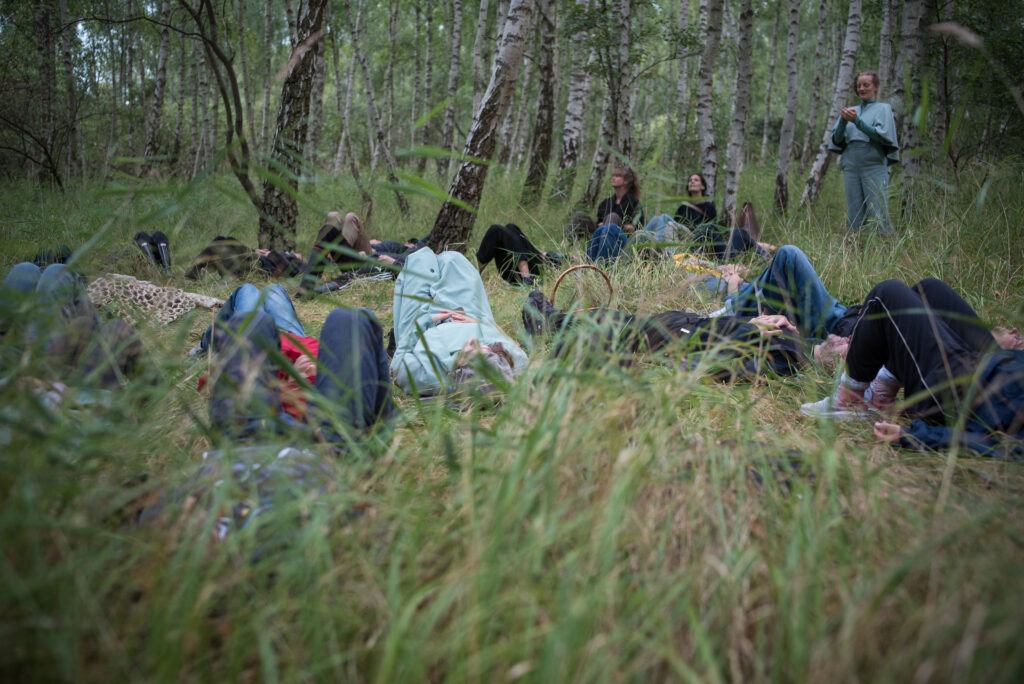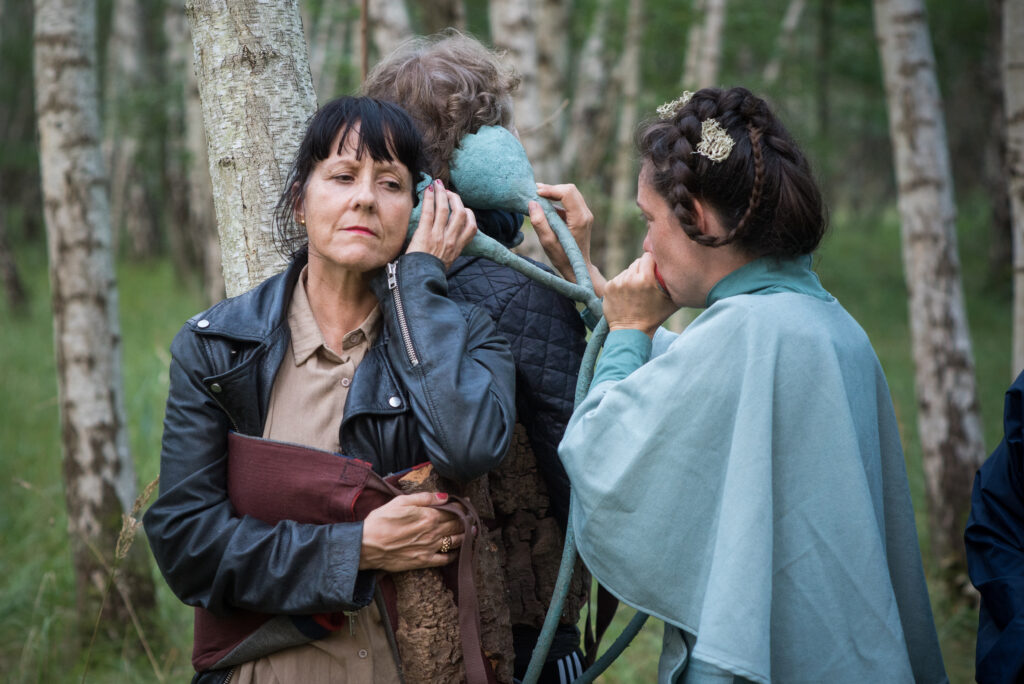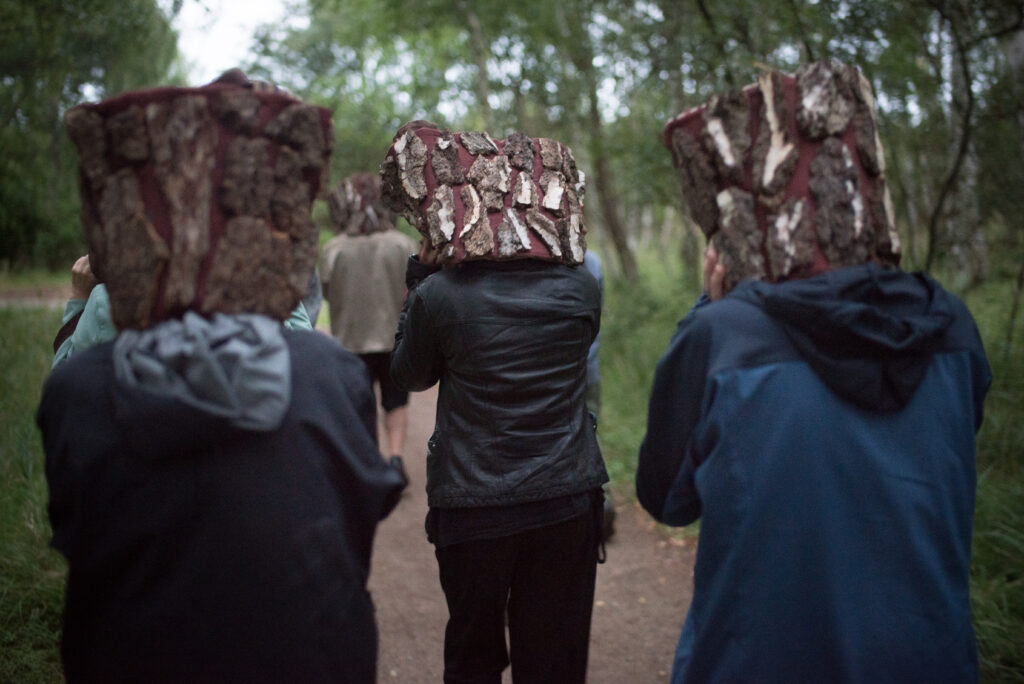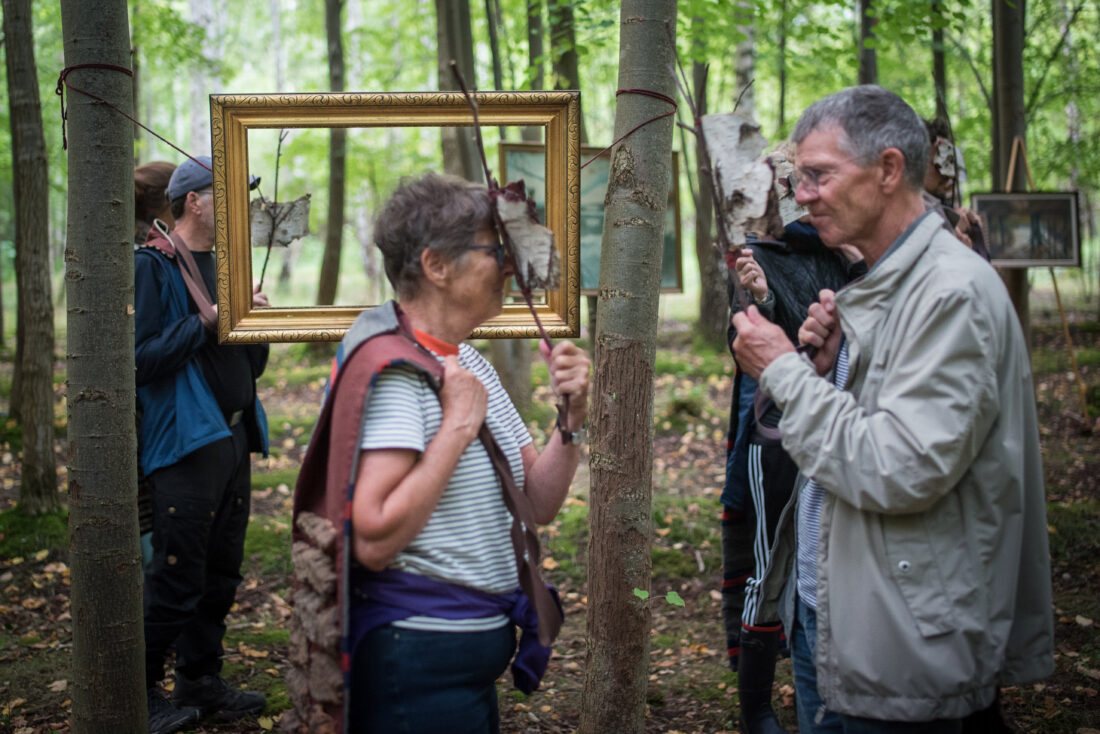Nature 2.0 – Reflections from Under Skov
By Season Butler
Season Butler is a writer, artist and dramaturg. She thinks a lot about youth and old age; solitude and community; negotiations with hope and what it means to look forward to an increasingly wily future. Her debut novel, Cygnet, was published in 2019 and won the 2020 Writers’ Guild Award for Best First Novel.
The forest says, you’re going to have to work for it.
We worked for it. We mounted our bikes with the forest in the distance, crossing a vast, semi-urban pasture to Secret Hotel’s meditative walking performance, Under Skov. As we pedalled, cows grazed and chewed on bilious seconds, mouth to stomach and back again, so nonchalant as to alight back onto elegance, long-haired, fluffy, cuddlemeifuckingdareyou. Their grazing land stretched on for a kilometre all around with new build apartment blocks bordering on three sides. At the edge of the road we cycle along, wildflowers form a kind of avenue: mugwort, Saint John’s wort, jewelweed, nightshade, big, fat red clover, inviting enough to make me envy the cows gobbling it for their evening repast.
It takes a long time before the forest shows its edges at the end of the path. Now, having worked, I have an appetite, and
The forest says, eat.
Eat.
I’m listening…
Eat minerals and mulch.
Mycelium, rocks, carcasses of all shapes and sizes,
discarded skin and hair and claws.
Eat slowly.
Eat so
slowly
that no one even notices.
“And, in reply, a choir of seedlings arching their necks out of rotted tree stumps, sucking life out of death. This forest eats itself and lives forever.”
(Barbara Kingsolver, The Poisonwood Bible)
We are greeted by two figures from the forest that I immediately think of as guides. Our guides remind me of something from Cicely Mary Barker’s Flower Fairy book, the ones that taught me when and where to find flowers by introducing me to their fairies when I was a child. And who are these fairies from Secret Hotel? Bluebells, Speedwells, spring flowers in Goldenrod season? And who respects a season anymore anyway?

In some ways, the forest was in-itself a stage. Its purpose and its managed-ness were in visible at times – when I could clearly see the rows in which the trees had been planted, and I imagined that the forest might speak a cousin language to the lingua franca of the new-built neighbourhood at the other edge of the field. No shade, it’s not a diss. I’ve always thought nature was a social construct; I’ve never felt that something built is better than something encountered. Something summoned, though…
As a performance space, the forest was both set apart and permeable. The soundscape and meaningscape cycled outwards from the forest and inward towards us. Recorded sound from speakers at sporadic points along the path wafted up and drew a frame, as if to say, this is the work of animals, animals with two legs and prefrontal cortexes and online banking and many ways to brew coffee. #Nature? Nature 2.0?
The speakers’ soundscape flanked the path with its trails of dung – fresh and trodden – squished slugs and rainbow ropes of white slime clinging to damp and sandy exposed ground. Gravel underfoot, not-enough-buzz of not-enough-bugs. When I was a child, wouldn’t there have been more bugs in the height of summer? Doesn’t anyone respect a season anymore?

Most of the time, though, the soundscape blew through the space or sprinkled down onto us: those cud-chewing cuties from before, the cows still singing and growling away on their pastures, voices carrying after rush-hour’s end; a jet roaring from 30,000 feet, or a single piston engine craft buzzing overhead like an overgrown mosquito.
Some sounds seem like both, from the forest and from without: the tiny party nearby, where people laugh tipsily, a group of touring cyclists using their bells judiciously, a toddler who just wants to go home already. And maybe also the interventions of our Bluebell guides when they whisper to us, invite us to play unpredictable notes on inverted pinecones (this is delightful; I recommend it to anyone who likes hand-held percussion) or pour steaming tea into charming hand-thrown ceramic cups.
This same quality resonates with offer that the Bluebell guides give each member of the audience, ingenious bundles of cloth and bark that sometimes allow us to assume something like an insider position through a kind of arboreal drag, and sometimes support our outsider position by supporting bodies that are likely to be unaccustomed to passing time on a forest floor.
 Our Bluebell guides take us through a series of vignettes where the forest and the performance speak, mostly asking us to see the forest differently and to imagine ourselves differently. The climax may have been a moment imagining – at the Bluebells’ request – that we imagine that everything we see can see us too. A sublime moment of surveillance in a benign panopticon.
Our Bluebell guides take us through a series of vignettes where the forest and the performance speak, mostly asking us to see the forest differently and to imagine ourselves differently. The climax may have been a moment imagining – at the Bluebells’ request – that we imagine that everything we see can see us too. A sublime moment of surveillance in a benign panopticon.
This piece invites engagement the depth of beech roots and the breadth of mycorrhizal web, appealing to all the senses.
As the performance approached its close, the light changed as it always has (and maybe always will) in a northern latitude in the height of summer. As we cycled back, the forest behind us, the cows continued their slow diner sur l’herbe, feasting through the sunset, the gloaming, the twilight, the dusk.



